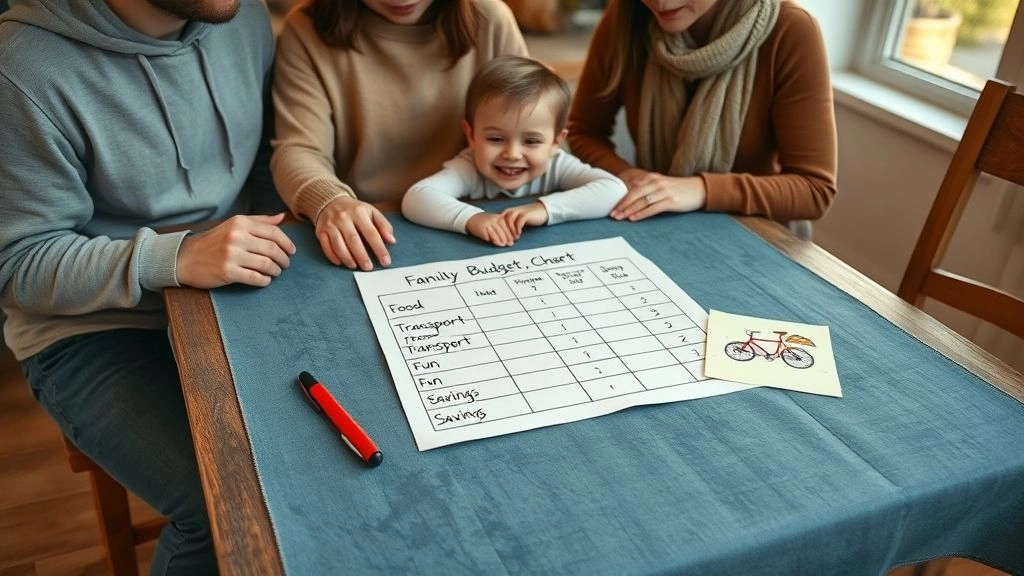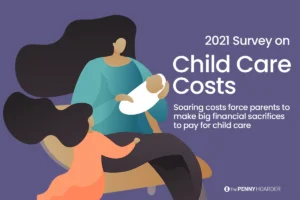Why Budgets Feel Tough
Have you ever opened up your bank app, stared at the numbers… and just blinked? Wondered, “Wait––where did my paycheck go?” If your money seems to vanish, and you’re tired of feeling like adulting is just endless bills and the odd ramen-for-dinner night, you’re in good company.
Let me tell you something personal—I started tracking just one week of my spending out of curiosity, and by the end, I was stunned. Coffee shop runs, a drive-thru here, a “just because” treat there… it added up to way more than all our streaming services combined.
So here’s a not-so-secret tip: you don’t have to be perfect with money. And you definitely don’t need spreadsheets that look like they were built by a robot. You just need a starting point. That’s where the idea behind What Is family budget comes in—not as a boring rulebook, but as a practical, sort-of-messy, truly life-changing guide for your household.
Why Even Bother?
What’s a Family Budget, Really?
It’s surprisingly simple: a family budget is just a plan for your household’s money—all the stuff that comes in (like jobs, side hustles, gifts from Aunt Sally) and all the stuff that goes out (rent, food, random Amazon finds). That’s it. No magic. It’s the proactive plan, not a guilt trip. Think of it like Google Maps for your dollars. Want to hit that vacation next summer? Or just feel less panicky when the car makes a weird noise? A budget gets you there—one step at a time, even if you take a few wrong turns.
Every family’s version looks a little different. Some list out every coffee and toothbrush. Others just track the big stuff. The key? Make it work for your real life.
Let’s Make It Real: Family Goals
According to research on 10 importance of family budget, having this roadmap helps you save more, argue less, and keep things (mostly) calm. It’s also not just about paying bills—it’s how families turn wishlists (“Let’s go to Disney!”) into doable plans. My friend Jordan, for example, realized she could afford soccer for both kids and their favorite takeout once a week… but only once she mapped it out. Before that? Every month felt like a surprise lottery, and sometimes she lost.
What Makes Up a Family Budget?
Categories Without the Chaos
Feeling overwhelmed by all the things you “should” track? Relax. Most folks think budgets mean tallying every single penny, but honestly… you can go broad. Check out this condensed overview using the 12 essential budget categories method. It’s about buckets—housing, food, child care, transport, health, savings, debt, and a few more. Not 42 mysterious sublists.
| Category | Needs Example | Wants Example | Frugal Swap |
|---|---|---|---|
| Food | Grocery runs, meal prep | Takeout 3x a week | Family taco night at home |
| Transport | Gas & bus pass | Rideshare to work daily | Bike on sunny days |
| Fun | Movie at home | Premium movie theater & candy | Popcorn + Disney+ night |
Even big financial brains (yup, like the folks who designed the Family Budget Calculator) agree: break it into what fits your world. Whether you rent a city apartment, or have three rowdy kids and a golden retriever in the suburbs, your budget should match your actual life—not your neighbor’s.
Tracking: The Surprising Secret
Okay, confession time. I used to think tracking every expense sounded tedious… until I realized I was missing trends completely. Turns out, all those $5 “treat yourself” moments did more damage than my monthly phone bill ever could.
Apps can help (some folks swear by YNAB or Monarch Money), but pen-and-paper works too. The real trick? Be honest with yourself. And no, you don’t have to show anyone your coffee spending tally (unless you want a laugh).
What matters: you spot your habits. That’s when you can actually make changes that stick.
Budgeting Without Family Drama
Team Effort, Not a Lecture
What Is family budget if not a chance to ditch awkward money talks? Family budgets work best when they’re shared. Like… actually talk about them, warts and all. Some of the best advice I got was this: involve everyone, including the kids (yeah, even if you just ask their input for Friday’s pizza or which streaming service gets the boot).
Research points out that including the whole family—especially kids—in budgeting conversations gives them practical money smarts for life. Let kids help decide on extra activities or shop for their school supplies with a set amount. They learn that, hey, if you pick shoes this month, maybe you don’t get fancy headphones until next month. Welcome to the real world, kiddo. It builds gratitude. (And, honestly, they start understanding “no” a little better because they see the big picture.)
Small Wins: Less Arguing, More High-Fives
Arguments about money? Totally normal. One survey said 31% of couples fight about finances. But when you set a family budget, stuff goes from “I thought we could…” to “Let’s check if it fits.” It’s less emotional because, well, the paper doesn’t lie. Read a few stories on the 10 importance of family budget page and you’ll see: budgeting isn’t about being strict, it’s about less stress, more plans.
What works for us? “Budget check-ins” at the dinner table, twice a year. Even the dog gets excited (okay, maybe he just likes the attention). Sometimes, we’ll go over by a bit. No drama—we course-correct together. Teamwork, not finger-pointing.
How to Actually Start Your Budget
Ready, Set… Go Messy!
Alright, let’s get practical. If you’re sitting there with a pile of receipts and three different budget apps on your phone, start basic:
- Add up all your income. Truly everything—salaries, freelance gigs, side hustles. (No shame if this includes selling random stuff on Facebook Marketplace!)
- List out expenses. Use the 12 essential budget categories as a cheat sheet. Start with must-haves (housing, food, bills), then wants (nights out, subscriptions, kid hobbies).
- Subtract and check. Is there money left at the end? Or, um… are you already in the red?
- Adjust honestly. If your “wants” are tipping you over, don’t panic—just trim back. Maybe swap two takeouts a week for one, or try a homemade pizza Fridays. That’s real-life frugality: tweaks, not misery.
If you’re more of a visual learner or just want to skip the math, check out the ready-to-use Family budget example—just pop in your numbers and you’re halfway there.
Handling Curveballs (Because Life Is Full of ‘Em)
I wish I could say budgeting makes money drama vanish, but… life happens. Maybe the furnace breaks (true story). Maybe you get hit with surprise school fees. Budgets aren’t walls—they’re more like safety nets. If your income changes month-to-month, list the lowest amount you expect. That way, anything extra is bonus, not a trap.
And don’t forget the “emergency” line in that budget. If you can, set aside even a few bucks a week. Three to six months of expenses is the gold standard, but don’t let that number scare you. Start somewhere. Every little bit adds up, especially when you don’t have to swipe the credit card for the next minor disaster.
When to Pivot and When to Celebrate
Budgets aren’t tattoos. It’s totally okay—required, really—to adjust them when life changes. Big raise? Add a savings goal. Lost some income? Tighten up but don’t shrink to zero fun. Celebrate small wins, too. First month you stick to your eating-out goal? That’s high-five material. I once managed two weeks cooking at home and felt like the queen of leftovers.
Example: my neighbors realized most of their “other” spending was for random app subscriptions. They cut half, started spending that cash on game nights instead. Budget win.
Why It’s Worth Figuring Out
Chill, You’re Doing Better Than You Think
You know those people who seem naturally “good with money”? I guarantee most of them have made their fair share of budget mistakes. Maybe they just learned to forgive themselves and keep adjusting. That’s what What Is family budget is about—finding freedom through structure, not stress.
Having a budget doesn’t mean you never splurge. It means your splurges are fun, not guilt bombs. Even if you’re starting from scratch, using resources like the Family budget example lets you see exactly where you stand. Maybe you save $20 the first month, or just find out where your money’s leaking away. That’s progress.
And if you’re raising kids… this kind of budget-building is low-key one of the best things you can do for them. Let them see that money isn’t a magic ATM—that planning leads to movie nights, birthday gifts, and fewer grown-up freakouts.
Final Thoughts: Your Budget, Your Wins
Okay, breathe. We just covered a lot. At its heart, What Is family budget is your personal playbook to get from “where did my money go?” to “oh hey, we actually have a plan.”
This isn’t about perfection—it’s about small, “hey, that actually worked!” moments. You don’t need a finance degree, just the willingness to try. Pick your simple categories, get everyone involved (yes, kids too), and check in as you go. Celebrate every minor victory, laugh at the flops, and keep moving forward.
If you want somewhere easy to start, peek at the Family budget example or revisit the 12 essential budget categories. Every tiny decision—skipping one takeout, hunting for cheaper groceries, swapping old habits for new ones—adds up. That’s what makes budgets feel, dare I say, a little bit magical.
And hey—share your own wins, flubs, or even your family’s weirdest budget arguments in the comments. Heck, maybe your tips will end up helping another tired parent, sneaky snacker, or hopeful saver. Because at the end of the day, your future self (and your whole family) will thank you for taking this step. Let’s build the life you all dream about, one (imperfect) budget at a time.












